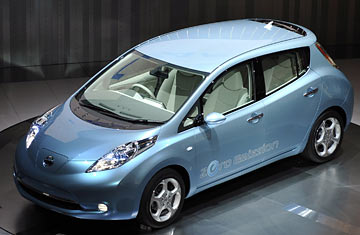
Reporters in Yokohama, Japan, take pictures of the new Nissan electric car called Leaf
Q'Orianka Kilcher has never pumped a gallon of gasoline into her car. Never. Then again, she's never owned a car that needed gasoline. You could say she is at ground zero of the ZE, or zero-emission, vehicle future.
A 19-year-old actress living in Santa Monica, Calif. (she played Pocahontas in the 2005 movie The New World), Q'Orianka (pronounced Quor-ee-anka) is on her second hydrogen-fuel-cell car, a Honda FCX Clarity, a four-door with a 200-mile range. "I don't think I will ever buy a gas car," she says. "I can go everywhere I want to go with this. Plus, it's a guy magnet."
Auto-marketing gurus take note: the brave new world of ZE cars is here, ready or not, and please make them sexy.
"ZEs are an entirely different paradigm," says Stephen Ellis, manager of fuel-cell-vehicle marketing for American Honda Motor Co. in Torrance, Calif. Ellis manages the rare $600-a-month leases (including free hydrogen fill-ups) for the FCX Clarity. "Knowing how to integrate these new technologies into existing lifestyles and then building new infrastructures to make it work is the trick," says Ellis. "It took a hundred years to create the gasoline infrastructure; this will be much faster."
There are three types of zero, or near zero, emission cars: electric plug-ins, hybrid plug-ins and hydrogen fuel cells (which create power by having oxygen and hydrogen pass over electricity-generating electrodes). But each major automaker has its own take on which advanced technology will win 10 years down the road.
Nissan, for example, is pedal-to-the-metal with pure electric cars, having skipped fuel-cell technology altogether. It considers "interim hybrid technology," like Toyota's successful Prius, a mere passing phase. "The market-share winner will be the one that offers affordable, mass-market, zero-emission vehicles with a zero payback period for premium technologies," says Mark Perry, director of the product planning and strategy group for Nissan North America.
The automaker's first electric, the Nissan Leaf, was launched last month and is touted as the world's first affordable ZE. No price has been announced (the Leaf is still 14 months away from being available), but it's estimated to come in under $30,000. It seats five adults, goes 100 miles on a charge with V6 performance, offers advanced electronics and will reach 90 m.p.h. Nissan says it will produce 50,000 electric cars globally by 2010, and it's scaling up plants. At full capacity, its Tennessee plant will produce 150,000 ZE vehicles and 200,000 battery packs. But like all new technologies, the Leaf will have some marketing challenges, not all of which have been test-driven, according to Perry.
"It's a very different sales process, especially with the inherent infrastructure challenges, like electric charging stations and in-home charging," he says. "It will be more of a consultative sale at the dealer level, and for some people, it may not be the right purchase."
"You'd never think of training consumers on how to fill up a gasoline-powered car," says Honda's Ellis. "But it's the very first thing we show them."
